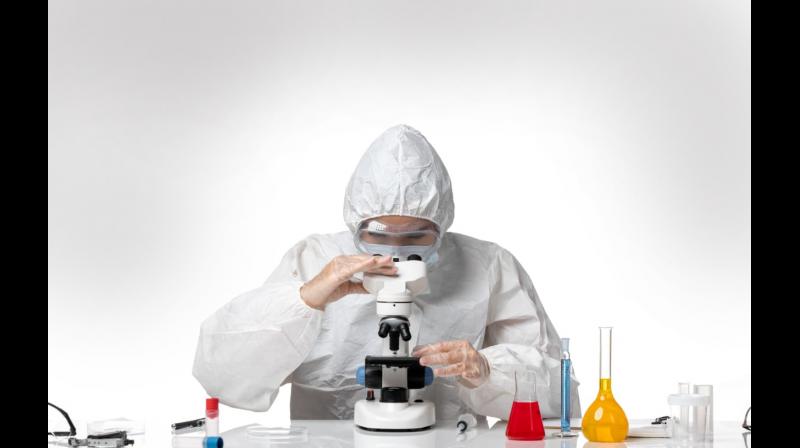The pandemic's silent saviours

The pandemic shone light on the dedicated contributions of the frontline healthcare workers — doctors, nurses and paramedics. But here’s another breed — the scientists and researchers — who’ve been silently and relentlessly working away at finding solutions to end the pandemic, cooped up in laboratories and high-risk environments. They’ve been engaged in sequencing the virus, finding the strains or variants, testing samples and developing vaccines to protect a billion people from the deadly coronavirus.
Most scientists associated with COVID-19 research in India have been working in the Indian Council of Medical Research (ICMR) laboratories, such as National Institute of Virology (NIV), Pune, Centre For Cellular And Molecular Biology (CCMB), Hyderabad, and in vaccine manufacturing facilities like Serum Institute of India (SII), Bharat Biotech International Limited (BBIL) and India Immunologicals Limited (IIL).
A look at how IIL works
IIL, a subsidiary of the autonomous National Dairy Development Board (NDDB), had been producing and delivering COVID-19 drug substance to BBIL for formulating them into vaccines, thus accelerating the Covaxin production. In fact, by December 2021, IIL hopes to manufacture around 10 million Covaxin substances from the current three million dosages.
Dr K Anand Kumar, Managing Director, IIL, credits the scientists and staff in the institution. “Since March 2020, they haven’t taken a single day off, working relentlessly, sometimes even for 48 hours at once,” he says.
Dr K Anand Kumar
Stating that before producing the COVID vaccine substance, the IIL was supplying lakhs of doses of paediatric vaccines for routine immunisation, Dr Anand Kumar points out that after the pandemic hit, IIL had to adapt and repurpose their facility and infrastructure. “We maintained the supply chain of existing vaccines, imported equipment from Sweden — all within a very short period, amid lockdown and limited transportation,” he adds.
IIL did upgrade its existing facility and executed technology transfer, manufacturing, testing and the release of drug substances at lightning speed, something Dr Anand Kumar credits to IIL’s prior experience in producing different types of viral vaccines for human and veterinary use.
“We’re currently engaged in developing a live attenuated COVID-19 vaccine, which may release next year. The scientists and staff have produced within a few months what usually takes several years,” he states adding that given the urgency of the nationwide situation, IIL invested their own funds in research without awaiting the centre’s funds, which was sanctioned in principle.
Scientists, researchers share their experiences
Unending work across departments
Ours is not actually a service or diagnostic lab, but since March 2020, we began testing samples and culturing the virus. In fact, ours was one of the very few labs in the country testing COVID samples in the initial months of the pandemic. It was a new experience for us and accordingly the lab had to be up-scaled to suit the requirement.
Dr T Karthik Bharadwaj
“Initially, with no automated report generation facility, we had to handle around 700 samples per day. Additionally, we had to handle the frequent enquiries from patients and VIPs. Getting samples and packaging and transporting them during the lockdown and pandemic amid manpower shortage added to the challenge. We also had to train several technical government hospital folks.
“I remember I was multi-tasking. While I had been involved in viral genome sequencing, studying various strains of the virus, I had to collect blood samples from ICU patients in local government hospitals. Additionally, I had to update with the state health department about the virus and positive cases. With no fixed timing for work, the first few months we worked almost 24/7.”
— Dr T Karthik Bharadwaj, scientist and medical geneticist at Council of Scientific and Industrial Research (CSIR)-CCMB, Hyderabad
No work-from-home option
There is no work from home for the scientists and researchers as they have put a lot of effort for developing vaccines and drugs. Employees in the manufacturing plant have worked round the clock to standardise the procedure of vaccine manufacturing and for timely manufacturing of the vaccines or medicine batches.
“My role was that of a technical expert in one of the COVID-19 vaccine projects. Even during the initial phases of lockdowns, being in the emergency service, we were all in the manufacturing plant.”
— Scientist from Bharat Biotech, requesting anonymity
Clinical trials that made history
Our institute was one of the 15 ICMR-approved centres in India for Covishield clinical trial. We were a 10-member multidisciplinary team from microbiology, pathology and community medicine departments involved in the project, who worked every day last year, including Sundays, taking off only during Dasara.
The main challenge was in procuring equipment amid the lockdown, recruiting within a month eligible volunteers, who didn’t have COVID antibodies and co-morbidities. Around 130 people, some of them doctors, approached us to volunteer. A few of them were positive. The clinical trial was a blind one, in which some were administered vaccines and others, given a placebo without any active ingredient, without the subjects’ knowledge.
“After the study and a six-month follow-up, the trial’s external audit took place, which included teams from SII, Pune. Ultimately, everything went off well and it was a great learning experience for us, and we’re a proud part of history.”
Dr Devi Madhavi, principal investigator for clinical trial project of Astra-Zeneca Covishield vaccine, Andhra Medical College (AMC), Visakhapatnam

